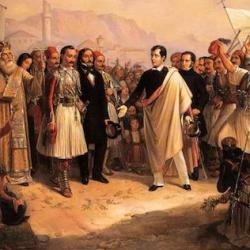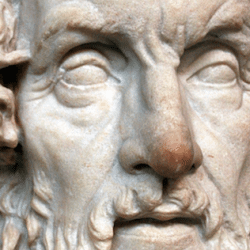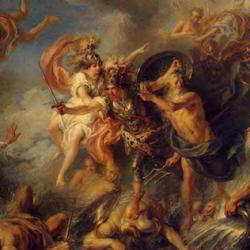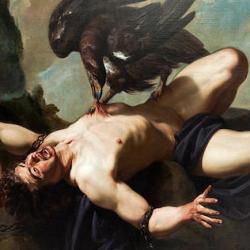Another insight from Sourvinou-Inwood: After offering a reconstruction of the development of tragedy from the hymns of the TRAGODOI through “prototragedy” (which introduced mimetic elements), she gives a brief review of the development of comedy. At the end, she contrasts the two both as regards their ritual contexts and their respective presentation of the gods: “while tragedy arose in the context of the establishment of order that began with the XENISMOS of Dionysos, and was completed with the processions and sacrifices that followed it, comedy emerged in the context of ritual dissolution, abnormality, and reversals. The different ritual contexts of the two genres account, I suggest, for some of their differences.” With regard to theology proper: The gods in tragedy are “representations, almost impersonations, of the real gods” and therefore “the gods in tragedy are not only not mocked, but not, ultimately, ‘criticized’; polis religion is not ‘challenged.’ The world is problematized in tragedy, and the human condition, and so religious issues, are explored, and the darkness of the cosmos acknowledged.” By contrast, the gods in comedy (eg, Frogs ) are insulted and mocked. Sourvinou-Inwood offers two contextual features that help to explain this: “First, the metatheatricality of comedy entails that the gods in comedy were perceived as comic constructs, rather than representations of the real gods; their identity as comic constructs was constantly foregrounded through the metatheatricality of the genre.” By the “metatheatrical” nature of comedy, she means that comedy mocks the conventions of tragic drama, it is a drama that serves as a criticism of drama; it is not MIMESIS of life but a drama about drama itself, a MIMESIS of a MIMESIS. (Think Space Balls , for example, or any movie by Mel Brooks.) “Second, the reason why they were mocked may be the result of comedy having been generated in a ritual context of an abnormal reversed world with the parameters of the reversed world continuing to affect the genre and its development even when it became removed from the KOMOS context.”
Now, if Sourvinou-Inwood is correct, something quite remarkable goes on in the history of comedy and tragedy. They don’t just intersect, but they seem to cross each other and change places. For Shakespeare, COMEDY is the genre of restored order; Midsummer Night’s Dream begins in chaos and frustration ?Einterestingly allied to a pseudo-order of Draconian law and paternal tyranny ?Eand moves through a carnivalesque confusion TOWARD order. Some of Shakespeare’s tragedies work this way too ( Macbeth ends with a wood marching in to take Scotland captive to spring and joy). But there are also tragedies ( Lear , of course) where there is no final resolution, no happy ending. I suppose that a case could be made that Aristophanes also moves us toward a new order of sorts: Birds wrest control of the cosmos from the gods. But Sourvinou-Inwood says that for the Greeks tragedy is the genre that re-enacts the establishment of civic order, not comedy. This bears more investigation.
Another notion suggests itself in Sourvinou-Inwood’s analysis: That tragedy is the genre of restored order precisely because it is connected with sacrifice (Girard playing heavily in the background). Pentheus is dismembered by devotees of Dionysus (including Agave, Pentheus’s own mother), and that dismemberment, however shocking and sad (not least to Agave), brings a troubled city to rest. Now: Is there a similar kind of sacrificial dynamic in Shakespearean comedy? Who is the scapegoat whose rejection restores order in the Athens of Dream ? Bottom? What brings Twelfth Night to comic resolution ?Ethe expulsion of Malvolio? These suggestions don’t seem to work. Rather, Shakespearean comedy seems to bring renewed order WITHOUT sacrifice. Or, if there is a sacrifice, it is a self-sacrifice, rather than sacrifice a scapegoat (a TRAGOS!). HERO, not the cad Claudio, “dies to live” so as to “prolong” her wedding day. And Hero is utterly and completely innocent, truly a “maid.”











